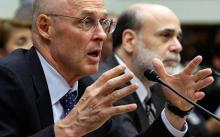There will be a depression anyway, but if the bailout “succeeds” there will be a complete meltdown in the not too distant future. Again the elite is pressing the fear button.
_____________________________________________________________________________

World markets depend on Paulson’s plan Photo: GETTY
London shares could lose a fifth of their value and the money market faces collapse unless US politicians succeed with their financial bail-out plan, it has been warned.
A leading investor predicted that the FTSE 100 could drop by as much as 1,000 points on Monday if Treasury Secretary Hank Paulson’s $700bn (£380bn) plan fails. Such a fall would come close to matching the stock market crash of 1987.
The warning came as markets lurched their way to the end of another fraught week amid fears that the White House rescue operation could be derailed in Congress by conservative Republicans.
However, hopes that a deal might be imminent spurred a last-minute rally on Wall Street, with the Dow Jones Industrial Average jumping 121.07, or 1.1pc, to 11,143.13. Financial stocks led the recovery following an early 158-point fall after news filtered out of Washington late on Thursday night that talks on the Paulson plan had broken down at an emergency White House summit.
The collapse of talks prompted the Bank of England to step forward yesterday with an emergency liquidity injection. The central bank has now effectively taken the place of large swathes of the interbank market, lending medium-term funds to banks that now refuse to lend to each other on anything beyond an overnight basis.
The Bank ordered drastic measures to prevent the City’s money markets collapsing, organising a £40bn auction of medium-term funds for Monday. Experts warned that unless the unusually large offering reignites the interbank markets that underpin the entire financial system, the Government may be forced into a US-style bail-out of its own.
One senior money market trader said: “If the US bail-out fails this weekend, I don’t know if there’s any point coming in on Monday.”
The mood in equity markets was hardly more upbeat. Bryan Johnston, investment director at Bell Lawrie, said: “If Paulson’s plan fails we will see a collapse in the markets and taxpayers will effectively pick up the tab. We could also see 1,000-point falls on the FTSE on Monday and we would be out of a job, while the banking system would freeze up.”
The FTSE dropped 108.55 points to 5088.47. With traders heading for safe haven investments, gold prices rose, with an ounce of the precious metal up $21.1 to $897.10. However, oil prices dropped as traders worried that world economic growth could be under threat. Brent crude dropped $3 before settling $1 down at $103.5. Meanwhile, the dollar slipped lower against other currencies.
George W Bush insisted that despite differences over the plan, “there is no disagreement that something substantial must be done”.
He added: “The legislative process is sometimes not very pretty, but we’re going to get a package passed. Republicans and Democrats will come together and pass a substantial rescue plan. Our proposal is a big proposal because we have a big problem. We need to move quickly.”
Gordon Brown, who was in New York yesterday, said: “In the short term, each country is taking action to deal with the fallout of the credit crunch. America deserves support from the rest of the world as it seeks to agree in detail what all parties have agreed in principle.”
Mr Brown and Bank of England Governor Mervyn King have come under increasing pressure to consider implementing further measures to revive money markets. Money market traders said interbank lending for terms of anything other than a day had effectively ceased, with lenders fearing their counterparties could become insolvent imminently.
The Bank co-ordinated its liquidity package with the US Federal Reserve, the European Central Bank and the Swiss National Bank, offering $30bn in cash for a week against eligible collateral.
The European efforts coincided with growing fears that Fortis, the Belgian-Dutch banking giant, faces a liquidity crisis. In response to a collapsing share price, it pledged to speed up a planned €5bn-€10bn (£4bn-8bn) of asset sales and named a new chief executive.
Expectations are rising that Fortis will be taken over either by France’s BNP Paribas or Dutch rival ING. The Belg-ian and Dutch governments have both convened to discuss the options for Fortis.
By Edmund Conway and Jamie Dunkley
Last Updated: 11:41PM BST 26 Sep 2008
Source: The Telegraph